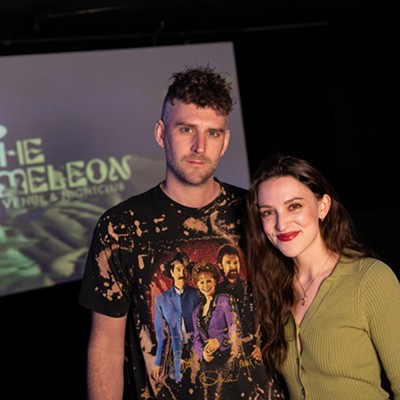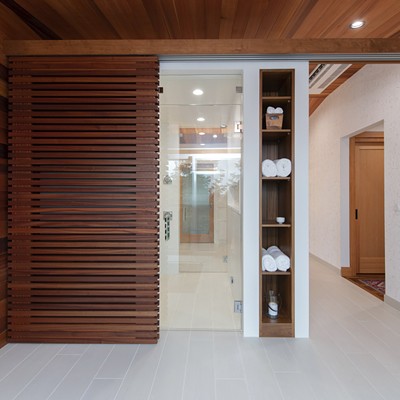In early July, Mateusz Wolski was teaching a private violin lesson at his home in the South Hill neighborhood when his phone buzzed with a text message from a New York number.
"Hey, I'm a manager of a Broadway tour," Mateusz says, recounting the message. "We had a violinist get sick, and we're looking for someone to play the Broadway show Hadestown."
Mateusz, the concertmaster for the Spokane Symphony, knew this was a big opportunity. He paused the lesson and called the number back.
"The guy says, 'Well, the show is tonight at 7 o'clock," Mateusz says.
It was already 4:45 pm. Mateusz didn't know the musical or the music. The director explained that Mateusz wouldn't just be playing in an ensemble, he'd be the sole violinist — onstage and in costume.
"It's not even like I'm playing in a section of violinists," Mateusz says. "So if you screw anything up, everybody will know."
The clock was ticking. Mateusz told the director he was down, but first, he had a lesson to finish.
The lesson wrapped up around 5 pm. Mateusz jumped in his car and raced down to the First Interstate Center for the Arts. He spent a frenzied 45 minutes going over the part with the music director and changed into his costume — a 1950s-esque tie and vest with a loud, red striped shirt.
Mateusz made it to the stage by 7 pm. As the show began, he played his newly learned parts to an in-ear monitor click track — a metronome that gives the musicians a cue for entrances and when the various songs start. The first half of the show went off without a hitch, but as the lights dimmed for the second act, Mateusz realized he had a problem.
The click track was gone.
Frantic, he gestured to the cellist next to him. She was able to use visual cues to let him know when to play. It worked, and Mateusz went on to play the next six shows of the musical. He was so focused on getting things right, it wasn't until the third or fourth show that he started to actually understand the plot of the musical.
"It was chaotic," Mateusz laughs.
Despite the chaos, Mateusz says the Hadestown experience was deeply rewarding. As a lifelong musician, he's not just used to the unpredictability and challenge that comes with live performance — he thrives on it. So does his wife, Dawn Wolski, who recently stepped down from her job directing the Inland Northwest Opera and now teaches vocal studies at Eastern Washington University.
"I find that we both always strive for excellence," Mateusz says. "For things to just be easy, middle of the road, not adventurous — it's just boring."
Dawn and Mateusz met in college in the early 2000s at the Manhattan School of Music in New York. Dawn was tasked with studying a tricky set of songs by Polish composer Frederic Chopin and tracked down Mateusz, a Polish native, for help translating some of the text. The pair clicked and married in 2003.
Dawn spent a few years in the U.S. Army's Field Band, and then took a job teaching voice at New York University. In 2007, Mateusz got a job offer with the Spokane Symphony, and the pair decided to pack up and move West. Spokane is a far cry from the bustling music scene of New York City, but the Wolskis say they quickly fell in love. In New York, there are dozens of concerts on any given night. In Spokane, there might just be a few. It's easier to catch everything, and people are more engaged in supporting the arts and making sure the scene thrives, Dawn says.
"We were embraced so quickly here," Dawn says. "We felt like such a valued part of the community."
After performing with the Inland Northwest Opera for several years, Dawn took over as the organization's executive director in 2017. The new role brought all sorts of challenges. Especially in spring 2020, when the pandemic halted live performances and threw arts organizations across the country into chaos. Dawn adapted quickly and spearheaded an effort to take performances to the street with an Opera Truck — a 16-foot truck converted into a mobile performance space. Mateusz, a car enthusiast, helped with the design process.
The Opera Truck was a ton of fun, Dawn says, and a great way to bring music to the people in a challenging time for arts and the community as a whole.
Mateusz says being unable to perform for a live audience was especially tough. As a performer, you become addicted to the adrenaline and dopamine rush that comes from going on stage, he says. Your whole life revolves around the routine of performance. Taking those things away can cause a sort of existential crisis.
"Not having a performance that is looming in front of you, it kind of erases your purpose," Mateusz says.
As Dawn worked on the Opera Truck, Mateusz found ways to adapt too. The Spokane Symphony arranged virtual performances. It was great to play music on stage again, but playing to a camera instead of a live audience was deeply weird, Mateusz says. As performers, the musicians were used to feeding off the energy of the crowd. They also wore masks on stage, which made it difficult to read each other's body language. And with everything recorded, there was no room for mistakes.
Mateusz says those performances were some of the most difficult he's ever done, but also some of the most rewarding.
"We did adapt, and we managed to deliver, I think, some of our finest performances," Mateusz says, adding that the performance was a testament to the importance of flexibility as a musician.
"It's a requirement of the job," Dawn adds.
As pandemic restrictions on live music fade, the couple has been staying busy. In addition to teaching, Dawn has continued to perform. Mateusz recently played a John Williams tribute to a sold-out house with the Spokane Symphony and took on a featured solo on a song from Schindler's List. ("It's brilliant music, but it's so many notes," Mateusz says.)
Over the past year, Dawn and Mateusz have collaborated on a different type of challenge: home renovation.
The Wolskis are redoing the entire upper level of their South Hill home. It's a massive, many-month project, and Mateusz is handling much of the construction himself. He speaks about his plans for the wooden doors and kitchen cabinets with the same passion he uses to describe a piece of music. (He once built a bedframe in the shape of a violin.)
The construction project is a nice change of pace, he says. A live music performance is temporal; a moment suspended in time that quickly evaporates. When you build a home, it's there to last.
"When you actually create something from wood or metal, or anything else, you can go a few years after that like, 'Hey, I actually built that,'" Mateusz says. "There's definitely that element that sometimes is missing when you're a performer."
The renovation will give the couple more room to host private lessons, Dawn says, but the larger goal is to create a place where people can come together: a place where fellow musicians can come hang out after concerts; a place where they can cook meals for friends and strangers; a place where their 6-year-old-son, Stefan, can grow.
It's an ambitious project to balance on top of their busy performance schedules, but the Wolskis say they're committed to the challenge.
"Both me and Dawn, what brought us together was projects," Mateusz says. "We're always project-ing something."
"Part of how our marriage survives is always having some kind of fun project to get into together," Dawn laughs.

























